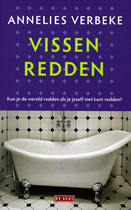Annelies Verbeke
Saving Fish (Vissen redden)
The art of self deceit
Annelies Verbeke’s new novel, Vissen redden (Saving Fish), is imbued with the pain of love lost. After writer Monique Champagne is left by her boyfriend Thomas, she turns away from literature, finding a new purpose in life, denouncing the dramatic decline of the world’s fish stocks. When asked to by an organisation to do a literary interlude at international conferences on fishing, she travels to Tallinn, and from there to Athens and Lisbon, on to Istanbul – although her performance there is cancelled – and to inhospitable Vladivostok.
In Tallinn, she meets an Austrian, who gives her the manuscript of his new novel to read. Knowing that if it is an autobiography, she should be careful of what he is hiding, but adrift in her pain, she spends a drunken night with him. Equally recklessly, she pretends to be someone else when a strange woman mistakes her for a long lost friend, and spends several days with her. In Vladivostok, she is convinced that her deepest desires can be fulfilled by a man she meets at the hotel, until it turns out he is active in illegal fishing. On the way home, she completely loses control of herself at the airport. She has lost the will to live, but, in a beautiful final scene, she survives her attempt at suicide through drowning. Monique’s preoccupation with fish and her obsession to save them arises from her awareness that man is the evolutionary descendant of fish, which came ashore 375 million years ago. Emotionally powerless and defeated, searching for her identity and meaning in her life, Monique attempts, equally foolishly and riskily, to escape her inner pain and grief. Through saving fish, she tries to save humanity, and eventually herself. Thus, the fact that she is washed ashore after she has tried to drown herself takes on a deep symbolic meaning.
Monique Champagne with her complex emotional life and bizarre obsession is a fascinating character. Her ecological mission involves the reader in an acute problem faced by the whole world, not one you would expect in a literary context. No less original is how impressively Verbeke has interwoven Monique’s personal account with the theory of evolution; laced with Verbeke’s typically contrary, ambiguous, laconic humour. Vissen redden is an intelligent, impressive novel.
Publisher
De Geus
Oude Vest 9
NL - 4811 HR Breda
TEL. +31 76 522 81 51
FAX +31 76 522 25 99
E-mail: [email protected]
Website: www.degeus.nl
Publishing details
Vissen redden (2009, 185 pp)

Biography
Annelies Verbeke (b. 1976) became instantly famous with her successful first novel Slaap! (Sleep! 2003). The Dutch edition sold more than 70,000 copies and was published in eighteen countries. Her second novel, Reus (Giant, 2006), and her collection of short stories Groener gras (Greener Grass, 2007) attracted attention for her surprisingly unusual realism and lightly bizarre and absurd humour. Annelies Verbeke also writes columns, film scripts and plays. With her new novel, Vissen redden, a new highlight in her career, she strengthens her position as one of the most prominent authors of her generation.
‘My stories are usually about the underdog,’ says Verbeke, ‘because to my mind, he is closer to the essence of life, and is therefore more interesting in his quest for his own truth. I want to move people, make them laugh and give them a feeling of solidarity, in the hope that this – even if only briefly – will draw them a little closer together.’
Website: www.anneliesverbeke.com
Quotes
Weeping without shedding a tear – due to a novel which has much to laugh about. That’s irresistible.
De Volkskrant
A love story of staggering proportions.
NRC Handelsblad
A very exciting novel in which the author amazes with unexpected turns, fast changes in tone and clever formulations. Since Sleep! Verbeke has undergone an impressive stylistic evolution. (…) Her best yet.
De Standaard
